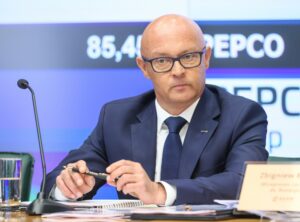„Politicians can eliminate possible risks and we count on such support regardless of who will govern Poland,” says Leszek Hołda, Country Manager at Bechtel Polska in an interview with BiznesAlert.pl.
BiznesAlert.pl: What role will Bechtel play in Poland’s nuclear program?
Leszek Hołda: Together with Westinghouse, we have formed a consortium to build the first nuclear power plant in Poland. My colleagues at Westinghouse are responsible for the nuclear island, which is where the reactor will be placed, and we are responsible for the rest of the project, which is about 70 percent of its value.
What does the project agreement require from your company?
The ESC (Engineering Service Contract) is an essential element that includes the project and the investment plan. At the same time, the consortium develops with the investor a table with risks and ways of mitigating them, taking into account the best practices from the Vogtle power plant project implemented for Southern Nuclear in the USA, prepares specifications for the equipment to be purchased, or estimates the costs of individual elements and services. Thanks to this, the investor, i.e. Polish Nuclear Power Plants (PEJ), will be able to talk to financial institutions about completing the financing.
What is the impact of the political changes in Poland?
We look forward to continuing the project. We need regulatory and administrative support. Politicians can eliminate possible risks and we count on such support regardless of who will govern Poland.
Are the supply chains for the first components already in place at this stage?
There is no decision yet on ordering long lead items. The consortium is talking to PEJ about this.
Does this mean more negotiations?
These are not negotiations, the teams from all three companies are working on the scope of the ESC agreement. Recommendations are made on this basis. The negotiations will focus on the EPC implementation agreement before the final investment decision for the nuclear project is made.
What about shareholder participation?
The position of the consortium is that we are not a natural partner to take part in this project. We are a contractor, not an owner.
What if the new Polish government expects such a commitment?
So far, we have no basis for talks on this issue, because there is no new government or official inquiries yet. If anyone thinks that taking ownership of the project would be a way to reduce the risks, I will remind that our experience learned in the USA – unique in the world – is enough to implement this project on time and on budget.
Does Bechtel still hope to participate in the second project in the other location?
Implementing the same technology at two locations makes sense. We assume that in the first project about 50 percent of the work will be carried out by Polish companies. It’s several hundred entities that will acquire skills and know-how, thanks to which they will achieve the level of quality of services and products necessary in the nuclear sector. This can be then used during the construction at the second location where the economies of scale will work. Operating both locations is also easier when they use the same technology and the same teams equipped with the necessary knowledge. Therefore, using Westinghouse technology and Bechtel’s involvement in the second location is by many measures the most optimal and beneficial choice.
Is it possible to reconcile the organization of several different projects in Poland?
If the schedules in Poland overlap, there could be some delays as the supply chain and workforce will be limited.
Does Poland have time to ponder?
At COP28 in Dubai, 22 countries pledged to triple their nuclear capacity by 2050. So the queue is growing. If Poland steps out and then decides to come back in a few months, it may turn out that this action will result in a few years of delay, because it will end up at the end of the line. That is why it is so important to continue the project. Poland is currently at the forefront of the race: it has partners, a project that has already started and a vision for implementation. We have an advantage in the region. Bechtel also wants to build an engineering competence center. We would like to use these resources for other projects so that Poland can become the center of nuclear competence in the region.
How will Bechtel benefit from Washington’s political involvement in Poland’s nuclear projects?
This is a good thing and concerns the intergovernmental level. Bechtel is a private company and a fifth generation family business. We look at this issue from the point of view of business, but also the possibility of leaving a positive legacy in Poland, which is very important for us. When it comes to engineering work itself, we want to hire 600-700 people from Poland and about 200 from the USA, who will support the local team with their knowledge and experience from other previously implemented projects. At the peak of the construction of the nuclear unit, thre will be about 8 thousand employees engaged in its implementation.
There are voices that the atom will not pay off and will be delayed, and it is better to invest in biomethane.
From Poland’s point of view, the priority is the country’s energy security and securing the capacity of the Polish energy system with nuclear reactors. Especially if the plan is to replace coal sources with another stable solution. There is no other stabilizing technology, that would guarantee energy supply in the event that renewables do not provide it. Currently, there is no energy storage technology to store energy for longer and on a large scale.
Is there a risk of protests?
It is the investor’s role to handle the dialogue. According to the polls, the support for nuclear power in Poland is at around 70-80 percent and it is the highest in history. For those who are not yet convinced, there are many arguments showing that Poland needs nuclear power.
There are a lot of media reports on the atom in Poland. However, we would also like to hear what industry experts like Bechtel think about the 2033 deadline?
That’s a question for Polish Nuclear Power Plants. There is an intermediate step in the form of the ESC agreement – within its framework, the parties are working intensively to confirm the optimal schedule for the implementation of the project. All the knowledge gathered by Bechtel will be transferred to the Polish project team so that they have all the tools to present the schedule no later than 1.5 years after signing the contract. It is good that there is such a solution-it will allow us to better prepare for the signing of the EPC agreement, because the alternative could be concluding the deal, and then signing an annex with new costs and a deadline. The project agreement will confirm the milestones, but today we assume that the first shovel will be driven into the ground in 2026.
What milestones are ahead of us?
The execution agreement (EPC), which should be signed within 18-24 months. Until then, we will provide products from the project contract on an ongoing basis.
Will 2033 remain up in the air until the construction contract is signed?
It is in the EPC agreement that a schedule binding all parties will be provided.
So, the only thing left to do is build.
That’s why we are not stopping (laughter).
Interview by Wojciech Jakóbik









